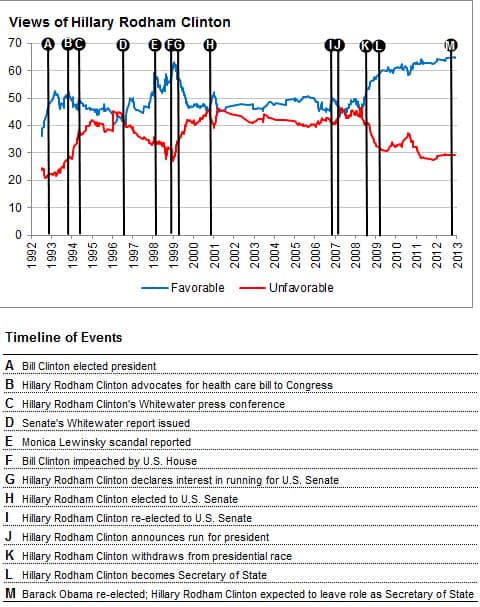Nate Silver takes a look at Hillary Clinton's chances in 2016 with regard to a moving average of Mrs. Clinton's favorable and unfavorable ratings dating back to 1992. Silver notes that Clinton is popular now, but boosted by the fact that her role as Secretary of State is for the most part non-partisan, and that at the times when she has become an "explicitly political figure" her favorability has also taken a hit:
 The surge in Mrs. Clinton's favorability ratings late in the 2008 campaign, although perhaps partly testifying to her steadily improving skills as a campaigner and to her new role as an underdog in the Democratic primary race, may also have reflected the fact that Republicans had less incentive to criticize her. Instead, they were trying to woo her supporters — or bolster her chances to prolong the Democratic nomination process.
The surge in Mrs. Clinton's favorability ratings late in the 2008 campaign, although perhaps partly testifying to her steadily improving skills as a campaigner and to her new role as an underdog in the Democratic primary race, may also have reflected the fact that Republicans had less incentive to criticize her. Instead, they were trying to woo her supporters — or bolster her chances to prolong the Democratic nomination process.
…
A secretary of state is not necessarily above partisan criticism, but attacking a secretary of state can potentially backfire on the opposition party. As Mitt Romney discovered during the presidential campaign foreign affairs can present an unlevel playing field to the opposition party. The White House and the Department of State have a number of defenses that they can employ to shield themselves from criticism, from claiming that they are protecting the national interest, to accusing their opponents of being unpatriotic, to arguing that their opponents lack knowledge of the situation on the ground. The secretary of state, like the president, also enjoys the symbolic trappings of incumbency when she conducts diplomatic affairs.
Were Mrs. Clinton to run for president again, she would lose most of these advantages. Republicans would begin to criticize her, delicately at first, and then more expressly as the election drew nearer.
Silver's Clinton chart, AFTER THE JUMP…




